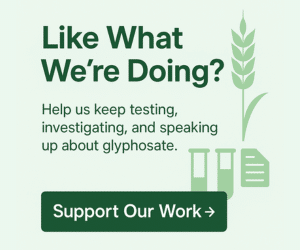Whose Narrative Is It Anyway?
Autism used to be a rare diagnosis. Now it’s everywhere.
The numbers are startling: from 1 in 2,500 children in the 1980s to 1 in 31 today in the U.S., depending on the dataset. Naturally, theories have erupted. Some people point the finger at vaccines. Others say it’s just better diagnostics. The official line? Mostly genetics.
But what if we’re missing something? What if we’ve become so consumed with defending or attacking the vaccine narrative that we’ve ignored other potential triggers hiding in plain sight? Like glyphosate.
The Timeline Problem: Too Many Red Flags to Ignore
Let’s zoom out. The modern vaccine schedule did indeed expand rapidly after the 1986 National Childhood Vaccine Injury Act in the U.S. But that same period saw another seismic shift: the rise of genetically engineered crops and glyphosate-tolerant farming. Since the mid-1990s, glyphosate use has skyrocketed—not just on farms, but on sidewalks, school fields, and backyards.
So which came first? That’s the wrong question. The real question is: Are we looking at an ecosystem of exposures that collectively overload a developing child’s immune and neurological systems?
Glyphosate 101: More Than a Weedkiller
It’s marketed as safe, but glyphosate is anything but inert. It was originally patented as a metal chelator and antibiotic, not just a herbicide. It kills plants by disrupting the shikimate pathway—a biological route not found in humans but critical in our gut microbiome.
And here’s the twist: that microbiome plays a central role in everything from nutrient absorption to brain development to immune regulation. Glyphosate doesn’t have to act directly on human cells to cause problems. It just has to knock over the first domino.
Gut-Brain Connection: Where Glyphosate and Autism Intersect
The link between gut health and brain function isn’t fringe science anymore. Researchers have mapped complex pathways between the gut microbiota and neurological signaling—including serotonin production, immune modulation, and even blood-brain barrier permeability.
Disrupt the gut early enough in life, and you might set the stage for neurological chaos.
Studies That Hint at a Link
A few researchers, most notably Dr. Stephanie Seneff, have published correlational analyses showing strong statistical overlaps between glyphosate usage and autism rates. Animal studies suggest that glyphosate exposure during pregnancy can lead to behavioral changes in offspring. Other studies link it to oxidative stress, mitochondrial dysfunction, and neuroinflammation—all factors implicated in autism spectrum disorders.
Of course, correlation isn’t causation. But at what point does repeated correlation become a signal worth listening to?
Weaken the Defenses, Widen the Risk
Here’s one possible model: Vaccines (especially multiple early-life doses) challenge the immune system. Glyphosate (via diet, water, and the womb) weakens the body’s regulatory defenses. Together, they form a one-two punch. The child might recover from one hit—but maybe not both.
Then again, it might happen in reverse.
Glyphosate in the womb may disrupt fetal microbiome development or compromise the placenta. That sets up the child for a hyperreactive immune state—so when the first injections arrive, the system overreacts.
Either way, we’re not dealing with isolated factors. We’re dealing with cumulative, layered stressors in a child’s most vulnerable years.
Why Isn’t This Being Studied?
The sad truth is that our research systems are siloed and heavily politicized. Glyphosate studies are dominated by agricultural industry influence. Vaccine safety research is mostly run by pharmaceutical-aligned institutions. And nobody wants to look at interactions.
What would happen if we dared to study how multiple low-level exposures might combine to trigger autism? That’s the question no one in power seems eager to ask.
Final Thought: What If It’s Everything?
Maybe we’re chasing the wrong ghost by looking for a single cause. Maybe autism isn’t the result of one villain but the cumulative breakdown of a fragile system, overwhelmed by too many inputs, too soon.
Glyphosate may not be the sole culprit. But dismissing its role without full investigation is reckless.
Because whether it opens the door or just walks through one already ajar—glyphosate, like so many modern chemicals, may be part of a bigger story. And that story isn’t just about autism. It’s about how we’ve changed the world around us faster than our children can adapt.
Resources & References:
If we’re serious about understanding autism—and not just defending pre-approved narratives—we need to follow the trail wherever it leads. The studies below don’t claim to have all the answers, but they challenge the official silence around glyphosate. From peer-reviewed experiments to eye-opening correlations, these resources invite deeper questioning. Not confirmation, but curiosity.
Glyphosate and Autism Correlation Studies
Samsel & Seneff:
Anthony Samsel and Stephanie Seneff have published a series of papers exploring the potential link between glyphosate exposure and various chronic diseases, including autism. They propose that glyphosate disrupts gut bacteria and mimics glycine, leading to systemic health issues.
Link: The Possible Link between Autism and Glyphosate Acting as Glycine Mimetic
Liver and Kidney Damage from Low-Dose Roundup Exposure
Mesnage et al. (2015)
This study investigated the effects of chronic ultra-low dose exposure to Roundup in rats. The findings indicated significant alterations in gene expression related to liver and kidney function, suggesting potential health risks even at low exposure levels.
Link: Transcriptome profile analysis reflects rat liver and kidney damage following chronic ultra-low dose Roundup exposure
Toxic Legacy: How the Weedkiller Glyphosate Is Destroying Our Health and the Environment
In her book Toxic Legacy, Dr. Stephanie Seneff presents a comprehensive review of glyphosate’s potential health impacts, arguing that its widespread use is linked to numerous chronic diseases, including autism. She emphasizes the need for a reevaluation of glyphosate’s safety.
Link: Toxic Legacy – Book Review
The Microbiota–Gut–Brain Axis and Neurodevelopmental Disorders
This review article discusses the role of the gut microbiota in neurodevelopment and its potential link to disorders such as autism. It highlights how gut bacteria can influence brain function through immune, neural, and endocrine pathways.
Link: The microbiota–gut–brain axis and neurodevelopmental disorders
Maternal Glyphosate Exposure and Autism-Like Behaviors in Offspring
A study published in the Proceedings of the National Academy of Sciences found that maternal exposure to glyphosate during pregnancy in mice led to autism-like behaviors in offspring, suggesting a potential risk factor for neurodevelopmental disorders.
Link: Maternal glyphosate exposure causes autism-like behaviors in offspring
None of these studies alone proves causation. But together, they paint a picture that’s hard to ignore—and even harder to research, given how quickly inquiry into environmental triggers gets shut down. In a world where our children are increasingly unwell, perhaps the more responsible question isn’t “Is it glyphosate?” but “Why haven’t we ruled it out?”
Image Source & Attribution
We’re grateful to the talented photographers and designers whose work enhances our content. The feature image on this page is by tetjanka. You can find more of their work here: https://www.123rf.com/profile_tetjanka.




